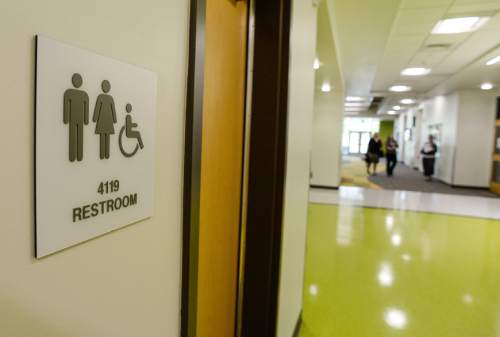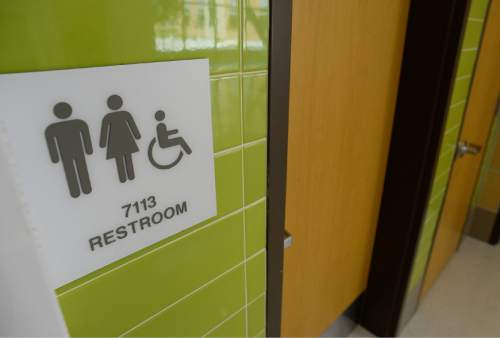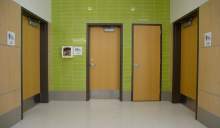This is an archived article that was published on sltrib.com in 2016, and information in the article may be outdated. It is provided only for personal research purposes and may not be reprinted.
Public school representatives along the Wasatch Front see little cause for concern after new nondiscrimination guidelines were released by the federal government last week.
But board members in at least one school district are urging Utah's governor, lawmakers and state school board to reject the guidelines, which call for equal treatment of transgender students.
In a "Dear Colleague" letter released Friday by the U.S. departments of justice and education, schools are instructed to allow students to use restrooms and locker rooms that are consistent with their gender identity, rather than the sex assigned at the student's birth.
Schools may offer single-occupancy or unisex options for students who voluntarily seek additional privacy, according to the letter. But transgender students cannot be prohibited from using traditional restrooms if they choose to do so.
"As is consistently recognized in civil rights cases," the letter states, "the desire to accommodate others' discomfort cannot justify a policy that singles out and disadvantages a particular class of students."
Utah Gov. Gary Herbert said Friday the state "will not hesitate" to fight the executive order.
Heather Bennett, board president for Salt Lake City School District, said the letter's instructions are consistent with nondiscrimination policies that already exist in hers and many other Utah school districts. The Salt Lake City School District board last month adopted policy S-13, which states that the board "strives to ensure that all students, including intersex, transgender, and gender nonconforming students, reach their fullest potential by creating safe and supportive environments in our schools."
"We've had transgender students in our schools for probably much longer than anyone acknowledges without any major upset," Bennett said. "They've been accommodated and continue to be accommodated in our schools."
She said "less than a half-dozen" parents contacted the school district with concerns after the Dear Colleague letter was released. And she has heard no pushback from educators.
"I'm not getting any sense of consternation from teachers or administrators that I've talked to," she said.
But in Alpine School District, located in Utah County, school board members Paula Hill, Wendy Hart and Brian Halladay released an open letter to state leaders, saying it is "morally reprehensible" to allow transgender students to use bathrooms, locker rooms and showers with students of the same gender identity.
They wrote that their board will vote next month on a district budget that is free of federal funding — which ties public schools to federal requirements — and urged state leaders to push back against the federal government, protect the privacy of children and make Utah "the shining city on a hill."
"The consequences of this social experiment would be disastrous," the board members wrote. "Not only as an invasion of the rights of a majority, but also with the potential legal liability this could incur upon school districts and the state, if we were to adopt this egregious guidance."
Other Utah school administrators were unfazed by the Dear Colleague letter.
Lana Hiskey, spokeswoman for Nebo School District, said administrators are focused on students and will continue working with families on an individual basis to provide accommodations.
"We always want to do what is appropriate for the child," she said. "If parents have concerns or needs, please come and personally visit with the administrator of your school to help meet those needs."
Representatives of Jordan School District and Murray School District said they expect some clarification and guidance to come from the state school board. But neither expected an abrupt change of policy, as schools were already required to comply with Title IX, which prohibits discrimination based on sex.
"In the past, we have responded to any related issues on a case-by-case basis and that has seemed to work for our district," said D. Wright, spokeswoman for Murray School District.
On its website, Davis School District includes guidance for how school administrators should accommodate transgender students.
When it comes to restrooms and locker rooms, schools are directed to consider the preference of the student and to make reasonable alternative arrangements, like a private area or unisex restroom, when available.
"A transgender student should not be required to use a locker room or restroom that conflicts with the gender identity consistently asserted at school by the students," the district website states.
Unisex restrooms are increasingly common in newer or remodeled schools, like the proposed Provo High School, which recently broke ground for construction, or at Mount Jordan Middle School in Sandy, which opened last fall.
At those schools, single-occupancy or family-style bathrooms are located adjacent to traditional men's and women's facilities.
"If a child at Mount Jordan wants that type of privacy, then we have the facilities available for them," said Jeff Haney, Canyons School District spokesman.
At older schools, unisex faculty restrooms can be made available if transgender students are uncomfortable in the restroom that corresponds with their gender identity.
"We have worked closely with each respective family and generally have provided access to the faculty restroom and/or an already an already available unisex restroom that are in some of our buildings," said Granite School District spokesman Ben Horsley.
Herbert spokesman Jon Cox said the governor would not challenge nondiscrimination policies adopted by local school districts.
States and individual schools are better able to address issues like restroom access, Cox said, than the Obama administration, with its one-size-fits-all mandates.
"In the past, we have left these kinds of decisions to the local school. They know the students and parents and are the ones most capable of finding an appropriate solution."
The Salt Lake City School District board is scheduled to review additional policy language in the coming weeks, Bennett said, that clarifies nondiscrimination policies for transgender students. Additional questions and concerns could surface as schools continue to work with students and their families, Bennett said. But she doesn't see any major conflict between current practice and what the federal government is asking educators to do.
"Every public school student deserves to feel safe and valued at school," she said. "That's what we strive to do no matter what the issues are."
The agenda for Tuesday's Legislative Management Committee was amended to include a review of the Dear Colleague letter.
The governor's response to the Dear Colleague letter also prompted the creation of a "Take a piss at the Capitol" event, in which organizers on Facebook invited people to gather at the Utah State Capitol on Friday to use the restroom that aligns with their gender identity. That protest was canceled Tuesday.
Twitter: @bjaminwood Utah schools and transgender restroom access
12:15 p.m. • Gov. Gary Herbert said he would fight if necessary an executive order issued by President Barack Obama requiring schools to allow transgender students to use the restrooms of their choice. On Tuesday, Salt Lake City School Superintendent McKell Withers, University of Utah LGBT Resource Center director Kai Medina-Martinez, Bill Duncan of the Sutherland Institute and University of Utah law professor Cliff Rosky join Jennifer Napier-Pearce to talk about gender identity and politics in education. Watch this online video chat at sltrib.com. You can also join the discussion by using #TribTalk on Twitter and Google+ or texting 801-609-8059.







